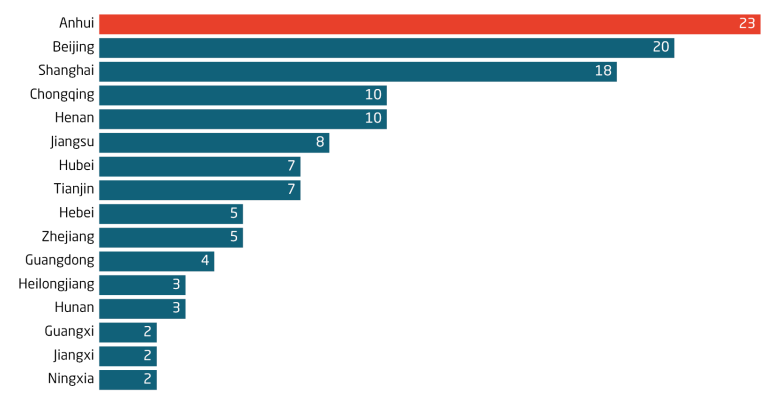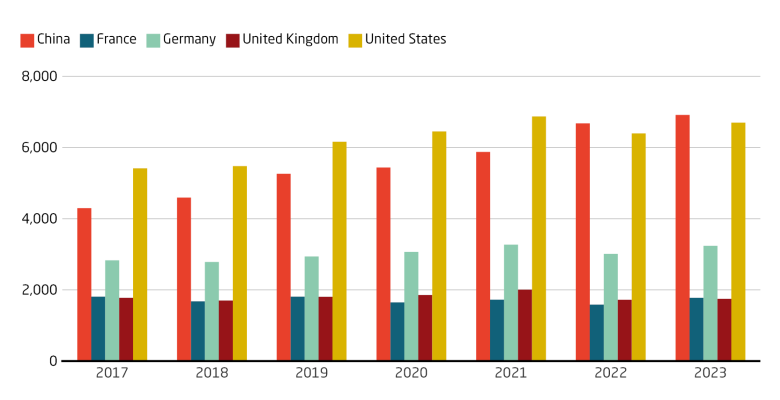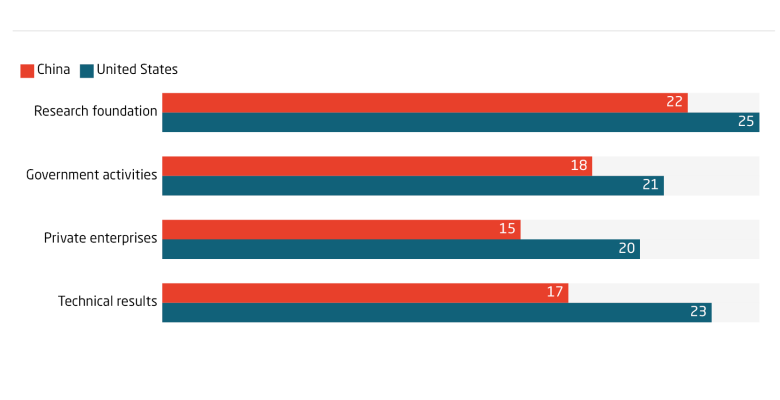
Quantum
Quantum technologies are emerging as a key subject of global power competition due to their potential military applications and ability to fundamentally transform people’s lives. Quantum effects can overcome limitations of digital technologies, solve computational problems that take impossibly long using traditional computers and transmit information over long distances without the risk of being intercepted. China hopes quantum technologies will allow it to leapfrog Western rivals.
China and the US are locked in a tight race for supremacy in quantum technologies. Through sustained government investment, China has achieved a number of firsts, including developing and launching the first quantum satellite, Micius.
While China has so far led in quantum communication, which enables secure communication over long distances, the US still leads in quantum computation.
China’s quantum technology development is a major result of mission-driven innovation. In the US, private companies like IBM dominate the race. So far at least, Chinese quantum technology companies and researchers have relied on government funding. Instead of large digital companies, startups founded by people with university affiliations, and usually funded by local or central government funds, dominate the landscape.
Quantum technologies are also a major area of international collaboration. Micius, the quantum satellite, was developed in cooperation with the University of Vienna, with future communication tests taking place between China and Russia. Many quantum technologies are still far from being market-ready but could provide decisive advantages to a military using them. As such, quantum research is at the forefront of discussions about research security in Europe.
Graphics dashboard

Quantum technologies are concentrated in Hefei, Anhui. Professor of Physics Pan Jian-Wei at the University of Science and Technology of China in Hefei is at the center of quantum technology development. He earned his PhD in Vienna and did a postdoc in Heidelberg before moving to Hefei to build a government-funded lab.

Since 2022, China-affiliated authors have published more research papers on quantum technologies than US-affiliated ones. The field is still highly internationalized, with many European countries also publishing significant papers. Germany is over-represented for its size, reflecting the world-class academic research taking place in Germany in quantum technologies.

A report on quantum technology of Chinese Academy of ICT (CAICT), a think tank under the Ministry of Industry and Information Technology, stated that the US still leads China in many indicators. Despite a solid research basis in quantum computing, CAICT said China must improve research commercialization, company development and industrial roll-out. Dependence on foreign technology was a key indicator.
Quantum in China: Timeline of crucial events
First A-listing of a quantum firm in China at the Shanghai Stock Exchange. The firm, QuantumCTek, offers quantum key distribution services for secure communications.
The US adds QuantumCTek to its Entity List of trade-restricted companies, cutting off access to key US technology.
China launches its second quantum satellite, Jinan 1, a successor to Micius, the first quantum satellite in the world. These satellites allow secure communication over long distances.
The MIIT issues “Implementation opinions for future industries,” detailing goals for quantum computing.
Origin Quantum presents the 24-qubit quantum computer Wukon. Some of the machines used to create it are reportedly German.


Researchers at the University of Science and Technology (USTC) in Hefei claim their photonic quantum computer Jiuzhang, using 76 photons, beats traditional computers (quantum supremacy).
Origin Quantum becomes China’s first unicorn (startup worth more than USD 1 billion) in quantum technology. Its founders came from the Chinese Academy of Science in Hefei.
China’s dedicated technical commission on quantum standards (TC578) issues its first national standard in quantum communication.
China and Russia successfully establish quantum communication over a distance of 3800 km, using China's quantum satellite. Earlier experiments had been conducted with Austria.
The US adds 22 Chinese organizations and firms to its Entity List, including Origin Quantum, USTC, and several CAS institutes. They can no longer import US-made technology.
Tech progress
- A Chinese research team successfully demonstrated a 7 km non-local quantum gate in Hefei, opening possibilities for distributed quantum computing. (Source CN: S&T Daily)
- Researchers at the University of Science and Technology of China were the first in the world to create a long-lived spin-based Schrödinger cat state, which enhances spin precession phase measurement sensitivity, with potential applications in quantum precision measurement, atomic magnetometers, and quantum information. (Source CN: S&T Daily)
- Domestic dilution chiller ez-Q Fridge was delivered to a customer. The fridge is the country's first commercially available mass dilution chiller required to make a superconducting quantum computer. (Source CN: People’s Daily)
Domestic dynamics
- Pan Jianwei, China’s quantum czar, expects China’s global quantum communication service, which provides watertight security and makes data hacker-proof, to be ready in the next five to ten years. (Source EN: Yicai)
- Superconducting and ion-trap approaches to quantum computing show most potential, according to a white paper by a government think tank. (Source CN: Chinese Academy of ICT)
- The China Quantum Computing Industry Summit in Guangzhou brought together over 100 key players to discuss partnerships, ecosystem development, and talent growth. Guangdong Guoteng and China Unicom launched the "Tianji" Quantum Security Service Platform. (Source CN: S&T Daily)
- Researchers (including Pan Jianwei) at the University of Science and Technology of China have built a cold-atom quantum simulator that confirmed the antiferromagnetic phase transition in the Fermi-Hubbard model, for the first time surpassing classical computing capabilities. (Source CN: S&T Daily)
Foreign involvement
- Researchers in Switzerland, led by China-born physicist Chu Yiwen and her PhD student Yang Yu, have developed the world’s first mechanical qubit – opening new possibilities for storing, manipulating and applying quantum information. Yang is a graduate of the University of Science and Technology of China (Source EN: South China Morning Post)
- The current bifurcation in quantum technology development between China and the West may lead to blind spots on China’s development. (Source EN: Effective Altruism)
- The US Commerce Department added China’s major entities engaged in quantum research and development to its Entity List for acquiring or attempting to acquire US-origin items to enhance the PRC's quantum capabilities. (Source EN: Bureau of Industry & Security)
- On June 17, China’s “Original Wukong” superconducting quantum computer was reported to have surpassed 10 million global visits and to have completed 236,000 quantum tasks. This achievement is seen as an indicator for China’s progress (Source CN: S&T Daily)

